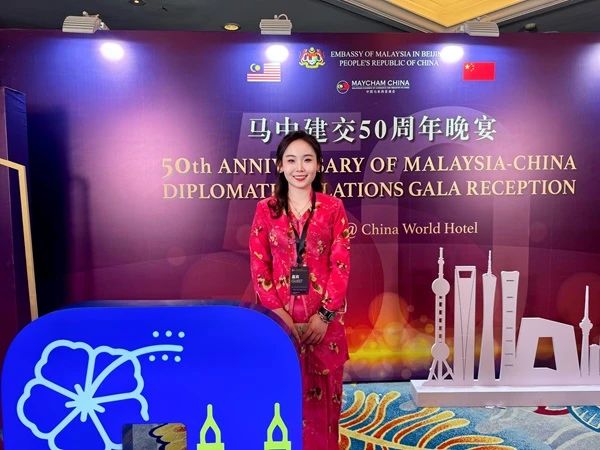Freshly graduated from Beijing Jiaotong University, four Southeast Asian students tell China Daily how studying in the Chinese capital has aided their personal development and helped to foster closer bonds between China and their homelands.
Beyond expectations
"I have understood China in a real-life context, rather than just relying on information from books and media," said Oudomxay Soukhavong, a 24-year-old student from Laos.
Having chosen to study in China, he majored in civil engineering and lived alone in Beijing before graduating from the city's Jiaotong University with a bachelor's degree. Oudomxay Soukhavong said his first impressions of China were of a "modern", "welcoming" and "diverse" country.

Oudomxay Soukhavong: "I have understood China in a real-life context, rather than just relying on information from books and media." [Photo provided to chinadaily.com.cn]
"The level of modernization in China is astonishing," said Nguyen Ha My from Vietnam.
"The people here are warm, hospitable, hardworking and intelligent, which strengthened my resolve to study here," she said.

Nguyen Ha My: "The level of modernization in China is astonishing." [Photo provided to chinadaily.com.cn]
My wouldn't hesitate to recommend China to fellow students back in Vietnam.
"Maintain a positive and open mindset, and be courageous in trying new things and challenging yourself," she added.
Seeing is believing and, as China continues to open its doors to the world, more and more foreign students are choosing the country as their favored place of study. By immersing themselves in Chinese life, they have discovered that the country is much more developed than they had imagined.
"Studying in China has been an eye-opening experience," said Tangkanjanapas Piya, a student from Thailand.
"China is not only vast in size but also advanced in many other aspects. I chose to major in transportation because of China's highly developed railway system," he said.
Closer ties, greater economy
Growing up under the rich cultural influence of her family, Malaysian Chinese student Joyce Ling Chieng Ying already had a deep understanding of China. However, upon arriving in the country, she was still amazed by the rate of economic and technological development.
"I've come to the right place in China," she said, noting that studying in Beijing has equipped her with the knowledge needed to contribute to economic development in her hometown—Sarawak in the east of Malaysia.
China and Malaysia have robust trade ties, further strengthened by the Belt and Road Initiative, with this year marking the golden anniversary of diplomatic relations between the two countries. Over the past decade, China has invested in a number of key projects in Malaysia, including the East Coast Rail Link, the Malaysia-China Kuantan Industrial Park and the Trans-Sabah Gas Pipeline.

Joyce Ling Chieng Ying: "I am optimistic about the future of cooperation and mutual benefit between the two countries." [Photo provided to chinadaily.com.cn]
This cooperation has led to significant developments in infrastructure and logistics, making the field of logistics management increasingly vital. By choosing this flagship major at Jiaotong University, Joyce aims to contribute to and capitalize upon these growing economic ties, helping to further enhance development and trade between the two countries.
"I am optimistic about the future of cooperation and mutual benefit between the two countries. I believe that most Malaysians are willing to contribute to the positive construction of a human community with a shared future," she said.
Oudomxay Soukhavong has a high regard for China's role in promoting economic development in his homeland, with the China-Laos Railway project a prominent example.
"I fully endorse the idea of 'If you want to get rich, build roads first', as it's crucial for economic development," he said.

Tangkanjanapas Piya: "China is not only vast in size but also advanced in many other aspects." [Photo provided to chinadaily.com.cn]
"The China-Laos Railway has enhanced Laos' transportation infrastructure, naturally elevating residents' income levels and quality of life," he added.
The China-Laos Railway was a landmark achievement of the BRI, commencing operations in December 2021 and spanning 1035 kilometers from Kunming in China's Yunnan province to the Lao capital Vientiane.
It is now a major transportation artery in Oudomxay Soukhavong's homeland.
"My career aspiration is to become an outstanding civil engineer and contribute to China-Laos cooperation in the future," he said.
With their bachelor's programs completed, Joyce, My, and Oudomxay Soukhavong have all decided to stay in China to continue their studies. Piya, a junior, is planning to do the same, too.
Thanks to initiatives such as the BRI, Chinese government scholarships and their own tenacity, they are now equipped with a wealth of knowledge and skills, ready to serve as envoys of international exchange.
Gao Wenjun contributed to this story.
责任编辑:崔宇康 陈羽佳
审核:袁芳 王瑞霞



